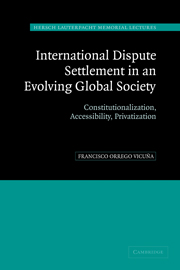 International Dispute Settlement in an Evolving Global Society
International Dispute Settlement in an Evolving Global Society Published online by Cambridge University Press: 04 August 2010
In the early twentieth century, several remarkable treaties introduced the then novel concept of the direct access of individuals to some international courts and tribunals. This was at the time considered as an exception to the general rule of state exclusivity in international dispute settlement. However, when exception after exception is introduced it is at some point reasonable to ask whether it has not become itself the general rule. Obviously, the answer to this question is not yet positive, but the experience of the twentieth century has clearly established a direction, and it may well be that the evolution will be completed in the present century.
First steps
The first step was to allow an individual to appeal a national decision before an international tribunal. This amounted to a gigantic conceptual innovation in international law, even though restricted to a very specific ambit. This first step was that of the Hague Convention XII of 1907 establishing the International Prize Court, under the terms of which individuals could bring an appeal against the decisions of national prize courts affecting their rights and bring other actions. The effort failed, however, not only because the Convention was never ratified but also for the reason that the state could forbid its nationals from instituting proceedings, or could do so in lieu of the individual, which showed that the state still prevailed in the claim process.
To save this book to your Kindle, first ensure [email protected] is added to your Approved Personal Document E-mail List under your Personal Document Settings on the Manage Your Content and Devices page of your Amazon account. Then enter the ‘name’ part of your Kindle email address below. Find out more about saving to your Kindle.
Note you can select to save to either the @free.kindle.com or @kindle.com variations. ‘@free.kindle.com’ emails are free but can only be saved to your device when it is connected to wi-fi. ‘@kindle.com’ emails can be delivered even when you are not connected to wi-fi, but note that service fees apply.
Find out more about the Kindle Personal Document Service.
To save content items to your account, please confirm that you agree to abide by our usage policies. If this is the first time you use this feature, you will be asked to authorise Cambridge Core to connect with your account. Find out more about saving content to Dropbox.
To save content items to your account, please confirm that you agree to abide by our usage policies. If this is the first time you use this feature, you will be asked to authorise Cambridge Core to connect with your account. Find out more about saving content to Google Drive.